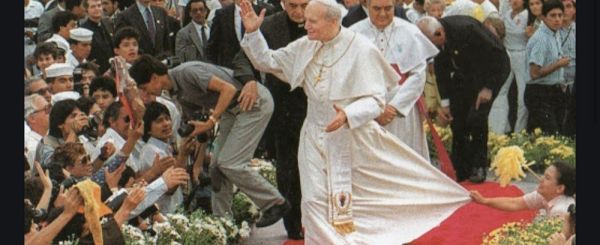The Church asks for forgiveness for the sins of her sons
Dear Brothers and Sisters,
1. "Blessed are you, O Lord, the God of our fathers.... For we have sinned and transgressed by departing from you, and we have done every kind of evil. Your commandments we have not heeded or observed" (Dn 3: 26, 29-30). This is how the Jews prayed after the Exile (cf. also Bar 2: 11-13), accepting responsibility for the sins committed by their fathers. The Church imitates their example and also asks forgiveness for the historical sins of her children.
In our century, in fact, the Second Vatican Council gave an important impetus to the Church's renewal, so that as a community of the saved she might become an ever more vivid image of Jesus' message to the world. Faithful to the teaching of the most recent Council, the Church is more and more aware that she can offer the world a consistent witness to the Lord only through the continual purification of her members. Therefore, "at once holy and always in need of purification, [she] follows constantly the path of penance and renewal" (Lumen gentium, n. 8).
2. Recognition of the community implications of sin spurs the Church to ask forgiveness for the "historical" sins of her children. She is prompted to do this by the valuable opportunity offered by the Great Jubilee of the Year 2000 which, following the teaching of the Second Vatican Council, intends to turn a new page of history by overcoming the obstacles that still divide human beings and Christians in particular.
In my Apostolic Letter Tertio millennio adveniente, I therefore asked that at the end of this second millennium "the Church should become more fully conscious of the sinfulness of her children, recalling all those times in history when they departed from the spirit of Christ and his Gospel and, instead of offering to the world the witness of a life inspired by the values of faith, indulged in ways of thinking and acting which were truly forms of counter-witness and scandal" (Tertio millennio adveniente, n. 33).
3. The recognition of historical sins presupposes taking a stand in relation to events as they really happened and which only a serene and complete historical reconstruction can reveal. On the other hand, the judging of historical events cannot prescind from a realistic study of the conditioning caused by individual cultural contexts, before attributing specific moral responsibilities to individuals.
The Church is certainly not afraid of the truth that emerges from history and is ready to acknowledge mistakes wherever they have been identified, especially when they involve the respect that is owed to individuals and communities. She is inclined to mistrust generalizations that excuse or condemn various historical periods. She entrusts the investigation of the past to patient, honest, scholarly reconstruction, free from confessional or ideological prejudices, regarding both the accusations brought against her and the wrongs she has suffered.
When they have been established by serious historical research, the Church feels it her duty to acknowledge the sins of her members and to ask God and her brethren to forgive them. This request for pardon must not be understoood as an expression of false humility or as a denial of her 2,000-year history, which is certainly richly deserving in the areas of charity, culture and holiness. Instead she responds to a necessary requirement of the truth, which, in addition to the positive aspects, recognizes the human limitations and weaknesses of the various generations of Christ's disciples.
4. The approach of the Jubilee calls attention to certain types of sin, past and present, for which we particularly need to ask the Father's mercy.
I am thinking first of all of the painful reality of the division among Christians. The wounds of the past, certainly not without sins on both sides, continue to scandalize the world. A second act of repentance concerns the acquiescence given to intolerance and even the use of violence in the service of truth (cf. Tertio millennio adveniente, n. 35). Although many acted here in good faith, it was certainly not evangelical to think that the truth should be imposed by force. Then there is the lack of discernment by many Christians in situations where basic human rights were violated. The request for forgiveness applies to whatever should have been done or was passed over in silence because of weakness or bad judgement, to what was done or said hesitantly or inappropriately.
On this and other points "the consideration of mitigating factors does not exonerate the Church from the obligation to express profound regret for the weaknesses of so many of her sons and daughters who sullied her face, preventing her from fully mirroring the image of her crucified Lord, the supreme witness of patient love and of humble meekness" (ibid.).
Thus the penitent attitude of the Church in our time, on the threshold of the third millennium, is not intended as a convenient historical revisionism, which at any rate would be as suspect as it is useless. Instead, it turns our gaze to the past and to the recognition of sins, so that they will serve as a lesson for a future of ever clearer witness.
[Pope John Paul II, General Audience 1 September 1999]












